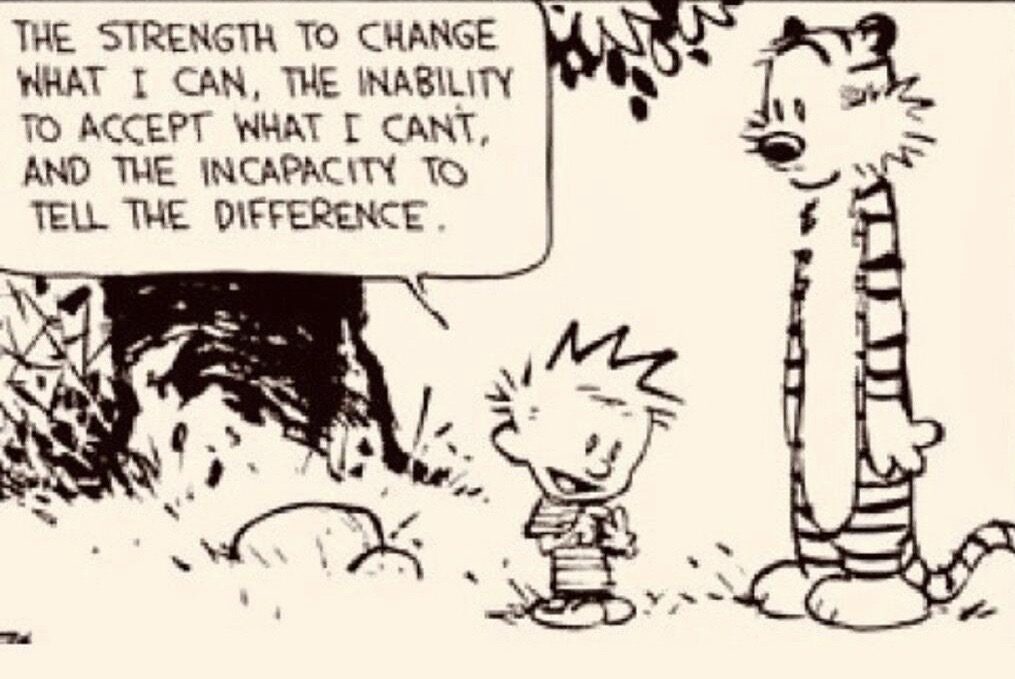What you do, if it’s not up to you

“ta eph’hemin,
ta ouk eph’hemin.”
The phrase mentioned above is an age-old Greek stoic phrase that translates to, “What is up to us, what is not up to us”.
Inherently unpredictable arena
There are things that you may influence, and then there are things that are beyond one’s control. It’s highly unlikely that you will ever control the unpredictable nature of life.
Take a look at our past histories, can’t you see how awful, vicious and unpredictable the world can be.
Can humans ever achieve dominance
During the past few decades, humans have witnessed unprecedented growth in the biotech and infotech fields that have led to the arrogant delusion that humans have become an invincible species. Sadly, you have to humbly accept the truth that we’re still extremely a vulnerable species.
What’s up to us
The immediate response to that question would be, you own and control your life, and few things will always be beyond your control.
Agreed, your body, mind, attitudes, choices, decisions, judgement, emotions, everything is under your control. People as members of an established sociopolitical system are entitled to have a life of their choice. You do feel in control of your actions and as the masters of your destiny. Few bumps in the road are not unusual, that can be dealt with.
But sometimes life catches you off guard.
What is not up to us?
External factors rule the world. You have to make concessions for the world around you. There is always something or someone that could alter your plan.
Nature with its unpredictable calamities, war, terrorism, economic crisis, life-altering disabilities, sickness, etc. are just a few to name. Bad things happen, no one knows when or how but they are sure to appear.
They used the word fate to describe such events which shaped our lives and destinies often without our consent.
Accepting the inevitable
Men from ancient times have noticed the occurrence of such sudden, unpredictable, unpleasant experiences in life that had the power to uproot or disrupt one’s life.
So when they talked anything about the future, they always gave room and a kind of reverence to this “unpredictable happenings”, preparing ourselves for the difficult choices that tomorrow will bring.
Around various cultures, people have come with different sayings from time to time. Like,
- As fate would have it
- Heaven forbid
- Nature permitting
- Man proposes God disposes
- God willing
- Anything that can go wrong can go wrong (Murphy’s law)
Whatever version you prefer, it’s all the same.

Amor fati
Amor fati means learning to love your fate.
How can anyone love unpleasant fates that leaves one devastated? What goodnesses can come from bad, that leaves us utterly miserable?
Sometimes the only option you’ve got is acceptance. It’s time to be humble and flexible. Mastering this art of acquiescence takes toughness and humility.
A strict teacher and reluctant students
In overcoming adversities, you emerge stronger, sharper and empowered. I know it sounds too philosophical! They can teach you a lesson you were reluctant to learn. We rarely consider how much worse things could have been as we always think about how much better we would like it to be.
Serenity prayer
The serenity prayer written by the American theologian Reinhold Niebuhr echoes the same values as that of the age-old stoic phrase.
It teaches us to make the crucial distinction to understand the difference between the things that are in our power and the elements that aren’t. Serenity prayer became more popular after it was included in the recovery programs for the addicts in Alcoholics Anonymous.
The prayer goes like,
God, grant me the serenity to
accept the things I cannot change
The courage to change the things I can,
And the wisdom to know the difference.
Bill Watterson’s version of the serenity prayer
Besides these profound philosophical thoughts, let me tell you about a recreated version of serenity prayer from Calvin and Hobbes creator Bill Watterson.
Bill Watterson has humorously captured how human nature wins over philosophical theories.
Here you find confused Calvin saying to a baffled Hobbes that,

“The strength to change what I can,
The inability to accept what I can’t,
And the incapacity to tell the difference!”
Like Calvin, we also struggle with accepting what we can’t change.
As Yuval Noah Harari said, “The ethical and philosophical history of the world is a rather depressing tale of wonderful ideals and less than ideal behaviour”.
Invest your energy wisely
Focusing exclusively on what is in your power enhances your power. The time and energy you invest in the things you can’t influence are wasted. Accept what you’re unable to change. Submit to a higher, more significant cause.
Remember
What happened would happen, and you’d go from there.




